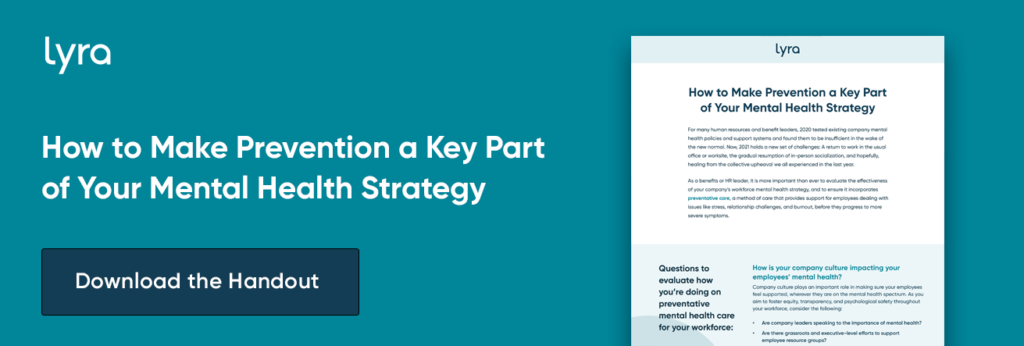How Can Preventative Care Improve Employee Mental Health?
January 14, 2021
Benefits and human resources professionals today are seeking proven ways to support employee health, control costs, and maintain productivity levels. Fortunately, it’s possible to achieve all three with a single strategy: preventative care.
For mental health, this type of care provides resources for employees dealing with issues on the milder end of the spectrum, such as stress, relationship challenges, and burnout before they progress to more severe symptoms. That’s crucial, because left unaddressed, less acute issues can evolve into dangerous health and mental health problems like depression, substance abuse, cardiovascular disease, and gastrointestinal conditions, to name a few. These more severe conditions can cause productivity to plummet and health care costs to surge. Stepping in with an effective preventative care program can help avoid this and can contribute to the overall wellbeing of your organization.
Here are five key ways the preventative care approach works for mental health:
1. Employees gain important resilience-building skills, helping them face future challenges
Addressing immediate mental health issues is necessary, but what about the next difficulty, and the next? Preventative care methods like mental health coaching incorporate evidence-based tools that improve emotional well-being and equip employees to more effectively respond to stressful events. This equips them to more successfully navigate the “next difficulty,” because they have already learned how to respond in healthy ways earlier when encountering a setback.
A key part of preventative mental health support is promoting resilience, or the ability to bounce back from stressful situations and setbacks. Mental health coaching and other preventative behavioral health techniques can help people learn new skills for coping with challenging situations and emotions. Research shows that promoting resilience helps people adapt faster and more easily to a wide variety of stressful situations, up to and including traumatic events.
2. Preventative care promotes greater self-awareness of changes in mental health
Often, early symptoms of stress and burnout progress because people don’t recognize the signs that they’re happening. Someone might become highly irritable, suffer from sleep problems, or start pouring an evening cocktail earlier and earlier–but they may not connect these behaviors with emotional distress. Preventative mental health care can help people become more attuned to how they’re feeling in the moment, which in turn can prevent these low-level problems from escalating into more serious issues.
Members in a preventative care program learn to “catch” signs of more serious mental health problems before they get worse, gaining the understanding they need to make connections between their emotions and actions. With increased awareness, they are more likely to seek out additional support when they need it.
3. Preventative care helps shift priorities about mental health toward what’s most important to each member
Often, people start preventative care thinking they need to focus on one problem, and then come away with a realization about an issue that they hadn’t anticipated. For example, a member might be struggling with relationship difficulties and enter care in hopes of gaining concrete skills for navigating conflicts. In addition to learning to do so, they may come away with a deeper sense of what’s important to them in their relationship as well as how they want to show up with their partner: With more compassion, understanding, and intimacy.
One major component of evidence-based methods used in preventative mental health care is values-based work: identifying and connecting with what’s most important to the individual, which is easy to lose touch with amidst the stress and demands of everyday life. Preventative care can provide an opportunity to help people identify their values—who they are and what they want out of life—which is an essential part of optimizing mental health.
4. Preventative care can improve physical health and lower overall healthcare costs
Research shows that mental and physical health are linked in significant ways. For instance, research on the “gut-brain axis” suggests that mental health problems can contribute to major digestive issues such as Crohn’s disease, which can lead to a tough-to-break cycle of worsening mental and physical health.
Preventative mental health screening and treatment can stop this ripple effect before it begins. Not only has prevention been found to improve physical and mental health for individuals, it can also lead to significant cost savings for individuals and entire organizations. For example, one study found considerable healthcare spending differences in diabetes patients who took part in a depression intervention program versus those who did not.
A research review focusing on mental health interventions and their economic impact emphasizes that simply having mental health programs in place is not enough—a program must be evidence-based, designed for a high level of problem-solving to ensure people get the appropriate care for their issue, and demonstrate cost-effectiveness.
5. Preventative care provides access to a dedicated support system
Knowing that someone has your back and wants you to succeed can be incredibly powerful. That’s why, once members enroll in any kind of care, Lyra’s goal is to provide that assurance and support and to ensure members in care are improving in measurable ways.
Using clinically validated measures helps screen employees and their family members for the right type of care, then monitor them to make sure they’re receiving the care they need. In some cases, this may mean transitioning to either a more or less intensive type of mental health support. Lyra also provides feedback-informed care, meaning that members are engaged in a conversation about their care using the measured outcomes to make sure they are improving and changing course if they are not.
This approach gives members choice and the opportunity to collaboratively design their own mental health treatment, while receiving the support and encouragement they need along the way. These evidence-based preventative mental health treatments are generally short-term and focused on helping members develop skills they can draw on to tackle future challenges and to become more resilient in the face of difficult situations.
Preventative mental health care can make an enormous difference for employees and employers, since the right program can significantly lower costs and improve productivity. When it comes to mental health, the old adage, “An ounce of prevention is worth a pound of cure” could not be more accurate.
Want to make preventative care a key part of your mental health strategy? DOWNLOAD OUR HANDOUT.
CONTACT US
If you’d like help connecting with a therapist or mental health coach, Lyra can assist you. You can get started today if Lyra is offered by your employer. Sign up now.
If you’re a mental health professional and want to explore joining the Lyra network, learn more about how we work with providers and apply today.
And check in frequently here or follow us on Facebook, LinkedIn, and Twitter for more insights into optimal well-being.
DISCLAIMER
The content of this blog is not intended to be a substitute for professional medical advice, diagnosis, or treatment.
ABOUT THE AUTHOR
Shane O’Neil-Hart, LCSW, is the Senior Clinical Manager of the Mental Health Coaching Program Lyra Health and an expert in Acceptance and Commitment Therapy (ACT). He serves as the Vice President of the San Francisco Bay Area chapter of the Association for Contextual Behavioral Science (ACBS), and provides psychotherapy, supervision, and training in ACT.
Author
The Lyra Team
The Lyra Team is made up of clinicians, writers, and experts who are passionate about mental health and workplace well-being. With backgrounds in clinical psychology, journalism, content strategy, and product marketing, we create research-backed content to help individuals and organizations improve workforce mental health.
Explore additional blogs

Mental health tips
How to Support Employees Through Life Transitions

Mental health tips
Unwrapping Wellness: Managing Holidays and Mental Health

Mental health tips
